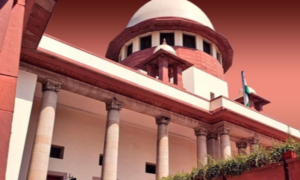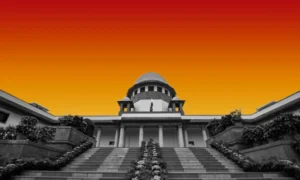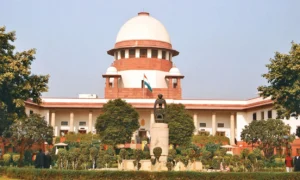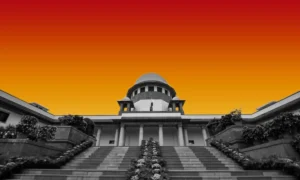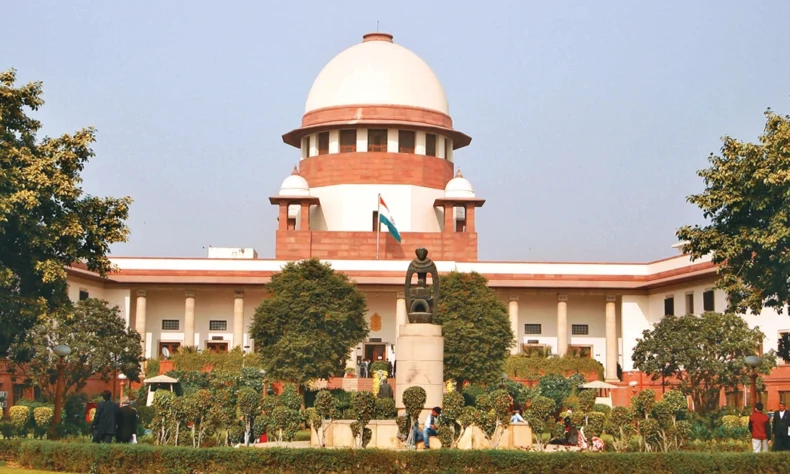
The Delhi Police on Thursday told the Supreme Court that the accused in the 2020 Delhi riots conspiracy case were not peaceful dissenters or intellectuals but individuals who allegedly attempted to orchestrate a coordinated, anti-constitutional insurrection with the objective of destabilising the elected government through orchestrated violence.
The submission was made by Additional Solicitor General SV Raju before the Bench of Justice Aravind Kumar and Justice NV Anjaria, while opposing the bail applications of accused Umar Khalid, Sharjeel Imam, Gulfisha Fatima, Meeran Haider, Shadab Ahmed and Mohd Saleem Khan.
All the accused were booked under the Unlawful Activities (Prevention) Act, along with provisions of the Indian Penal Code, for their alleged role in what the police described as a ‘regime-change operation’ carried out under the guise of protests against the Citizenship Amendment Act (CAA).
The ASG apprised the Apex Court that international media outlets had consistently portrayed the accused as persecuted intellectuals, ignoring what he described as incontrovertible evidentiary material demonstrating their alleged involvement in a pre-meditated conspiracy to instigate large-scale communal violence.
He argued that when individuals of intellectual, organisational or ideological influence engaged in acts of violent extremism, their capacity to mobilise and radicalise was far greater than that of “ground-level operatives.”
The law officer contended that protests against the CAA were not spontaneous expressions of political dissent but a coordinated programme designed to exert economic and administrative paralysis across multiple cities, timed strategically to coincide with the State visit of the then-United States President Donald Trump.
Highlighting the severity and scale of the violence, the ASG said it claimed 53 lives, including of an officer of the Intelligence Bureau, and caused injuries to more than 500 individuals. The whole act was done with the intent to provoke adverse international attention against India while inducing maximum political embarrassment to the Union government, he noted.
ASG Raju further apprised the Bench that the prosecution’s case was based on what it described as an extensive documentary, with electronic and digital evidence, including speeches, intercepted communications, WhatsApp groups, intercepted instructions, and other materials, allegedly demonstrating a coordinated plan to block arterial logistics corridors, obstruct supplies to Delhi, and incite civil disorder on religious lines.
The Delhi Police has filed a detailed 389-page affidavit opposing bail and asserting that the accused cannot seek parity with individuals previously granted release by the Delhi High Court, as the allegations here pertain to a broader criminal conspiracy under Sections 120B, 124A, 147, 302, 153A and other penal provisions, read with Sections 13, 16, 17 and 18 of the UAPA.
The ASG today screened excerpts of Sharjeel Imam’s speeches, alleging that they contained overt calls for violent blockade and secessionist intent, including references to isolating Assam from mainland India by blockading the vulnerable Siliguri Corridor (commonly called the ‘Chicken’s Neck’).
The accused invoked issues relating to Article 370, the Babri Masjid, triple talaq and the NRC to mobilise religious sentiment and precipitate a nationwide confrontation, asserting that the admitted objective, visible ‘between the lines,’ was to overthrow the constitutional government rather than to question legislation through peaceful democratic means, he added.
The Counsel appearing for the accused denied the allegations, asserting that the speeches relied upon by the prosecution were selectively extracted, stripped of context, and did not contain any express calls to violence.
It was argued that the accused had merely exercised their constitutionally protected right under Article 19(1)(a) and 19(1)(b) to express dissent and assemble peacefully.
The Counsel appearing for Khalid submitted that he was not even present in Delhi at the time when the riots took place. The lawyers representing Imam and Fatima contended that none of the protest sites where they were present witnessed any violent or unlawful conduct.
On the question of delay, the prosecution maintained that the prolonged pendency of the trial could not be invoked as an independent ground for bail.
ASG Raju relied on precedent, submitting that even extended incarceration did not automatically entitle an accused to release where serious offences under UAPA were involved, particularly when the prosecution possessed what it described as direct and cumulative evidence of conspiracy.
The Bench, however, noted that the judgment cited concerned a case where direct evidence existed, to which the ASG responded that similar material existed in the instant matter and would be presented in court.
He apprised the Bench that multiple administrative adjournments and delays in trial proceedings were attributable to the accused themselves. Therefore, these could not be invoked as grounds for statutory release.
The law officer further alleged that the accused utilised organised digital platforms and communication networks, including WhatsApp groups such as the ‘Muslim Students of JNU’ (MSJ) and ‘Jamia Coordination Committee’ (JCC), to coordinate mobilisation, messaging and logistical arrangements.
Arguments in the matter are expected to continue, with the Court reserving further consideration of whether prolonged incarceration, evidentiary sufficiency, or the scope of Article 21 jurisprudence governing pre-trial detention under special statutes such as the UAPA should tilt the balance in favour of bail or continued custody.
The Supreme Court is expected to make an assessment in light of its precedents in Watali, K.A. Najeeb, and other judgments, which define the limits of judicial scrutiny at the bail stage under anti-terror legislation.
📰 Crime Today News is proudly sponsored by DRYFRUIT & CO – A Brand by eFabby Global LLC
Design & Developed by Yes Mom Hosting



